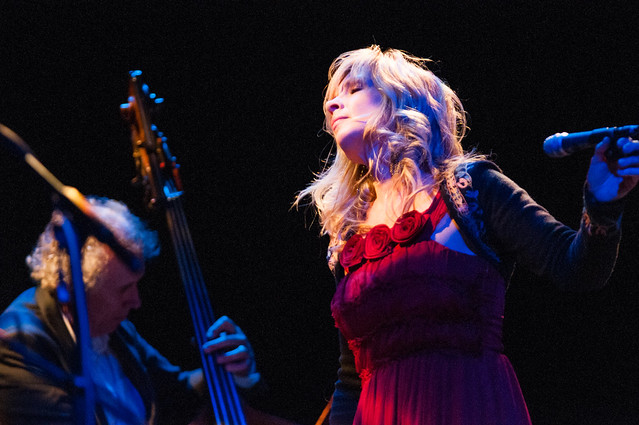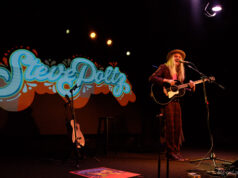
Over the Rhine performs live. (Photo courtesy Blind Ambition Management)
The band Over the Rhine takes its name from one of America’s largest intact urban historic districts. Located in Cincinnati, Ohio, it’s a working-class neighborhood built German immigrants in the mid-19th century. When Karin Bergquist and Linford Dettweiler formed their band in 1989, the makeup of Over-the-Rhine had changed and it had fallen on hard times. All of that came together in their show at City Winery recently.
You see, Karin and Linford wanted to create a sense of hope and contribute to the renewal of this historic treasure. Even though they moved to a pre-civil War farmhouse outside the city in 2005, their music continues to do just do that.
In March, OtR released its 19th album, Love & Revelation, a critically acclaimed record full of mature songs with the emotional resonance of being lived in while drawing from outside of Karin and Linford’s personal experience. “Broken Angels,” which opened Thursday’s concert at City Winery, bemoans the failure to connect, “like passing satellites.” The next song, “Born,” from 2005’s Drunkard Prayer, brought things up, ending on the line, “I’m gonna learn to love without fear.”
Between songs on April 18, Karin remarked that that this show was the band’s first time in the venue; later this month, City Winery DC marks its first anniversary. She went on to say that they picked an interesting day, referring to the release of Mueller report. Linford quipped that he redacted a number of songs from the set. And Karin told the audience that they have a new a record out, “which is good news. It means we’re not dead yet.”
After they finished bantering, OtR played a breakup song from the new album, “Las Lunas.” Linford told the audience about a conversation that he’d had with friend, artist and producer Joe Henry, about what a folk sound would sound like in 150 years. Folk songs, he reflected, hadn’t changed much in the last.
Stream Love & Revelation by Over the Rhine on Spotify:
Linford spoke about his father dying 11 years ago, while they were on tour in Birmingham, Alabama. He mentioned that he’d heard “a song is worth a thousand prayers.” In the next song, “Let You Down,” Karin sings about the burden of expectations in a relationship.
“Betting on the Muse” takes it title from a Charles Bukowski poem. In the poem, Linford told the audience, Bukowski writes about how a baseball player peaks early, playing into his 30s, if he’s lucky. A writer, by contrast, can continue to sharpen his craft throughout his life. Karin made Linford edit the song down; he removed verses about the homeless, fishnet stockings, the guillotine, and Jesus. “The good news,” Karin said dryly, “is the song is not as long as that introduction.”
After playing “Suitcase,” from their landmark 2003 album, Ohio, the boys — including the touring guitarist and keyboard — left Karin on stage to play “Given Road” solo. She said, “I could introduce it, but it’s a lot to live it up to.” After “Given Road,” the boys came back, and they talked about Karin’s guitar, a 1932 Epiphone Tenor. Karen told the audience that guitar was born the same year as her 87-year-old mother, whose health is somewhat shaky. Linford shifted the topic to the next song, “I’d Want You,” which he called “an apocalyptic love song.” He said that it “felt like a loss tumbled out of the old tenor.” “Love is difficult,” Linford added. “I’d like to dedicate this to anyone who’s been together more than a year.”
“Called Home,” from OtR’s expansive 2013 Meet Me At the Edge of the World, reflected on the emotions surrounding the farmhouse they bought in 2005. They closed their set with “All My Favorite People” from 2011’s The Long Surrender, a compassionate song that declares “All my favorite people are broken.”
Applause brought OtR back to the stage. Karin asked, “Are you ready to clap? That’s a dangerous proposition with a room full of white people.” The audience obliged as OtR launched into the gospel-inflected title cut of Love & Revelation.
For the second song of their encore, OtR played “Rocking Chair.” “Rocking Chair” eventually revealed that it’s told from the perspective of someone who often on the road worries about someone who needs care. The person in the rocking chair, the one who needs care, seems elderly. I get the sense that Karin wrote this about her feelings concerning her mother.
OtR sent the audience home with the hopeful “If a Song Could Be President.” The line “Steve Earle would anchor the news,” particularly amused me, because Steve is both utterly profane and utterly brilliant, as well as way, way left of center. Even the extremely offended viewers would still be better informed.






